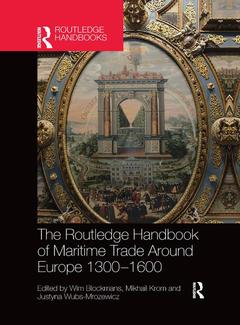The Routledge Handbook of Maritime Trade around Europe 1300-1600 Commercial Networks and Urban Autonomy Routledge History Handbooks Series
Coordonnateurs : Blockmans Wim, Krom Mikhail, Wubs-Mrozewicz Justyna

The Routledge Handbook of Maritime Trade around Europe 1300-1600 exploresthe links between maritime trading networks around Europe, from the Mediterranean and the Atlantic to the North and Baltic Seas. Maritime trade routes connected diverse geographical and cultural spheres, contributing to a more integrated Europe in both cultural and material terms. This volume explores networks? economic functions alongside their intercultural exchanges, contacts and practical arrangements in ports on the European coasts.
The collection takes as its central question how shippers and merchants were able to connect regional and interregional trade circuits around and beyond Europe in the late medieval period. It is divided into four parts, with chapters in Part I looking across broad themes such as ships and sailing routes, maritime law, financial linkages and linguistic exchanges. In the following parts - divided into the Mediterranean, the Baltic Sea, and the Atlantic and North Seas - contributors present case studies addressing themes including conflict resolution, relations between different types of main ports and their hinterland, the local institutional arrangements supporting maritime trade, and the advantages and challenges of locations around the continent. The volume concludes with a summary that points to the extraterritorial character of trading systems during this fascinating period of expansion.
Drawing together an international team of contributors, The Routledge Handbook of Maritime Trade around Europe is a vital contribution to the study of maritime history and the history of trade. It is essential reading for students and scholars in these fields.
List of figures
Preface
Notes on Contributors
- Wim Blockmans, Mikhail Krom and Justyna Wubs-Mrozewicz
- Richard W. Unger
- Stuart Jenks
- Donatella Calabi
- Agnete Nesse
- Albrecht Cordes
- Monique O’Connell
- Georg Christ
- Lovro Kuncevic
- Luisa Piccinno
- Carlo Taviani
- Thierry Pécout
- David Igual Luis
- Carsten Jahnke
- Justyna Wubs-Mrozewicz
- Anu Mänd and Ivar Leimus
- Pavel Lukin
- Alexei Vovin and Mikhail Krom
- Amelia Andrade and Flavio Miranda
- Mathias Tranchant
- Louis Sicking and Arjo Neele
- Maryanne Kowaleski
- Edda Frankot
- Geir Atle Ersland
- Wim Blockmans and Justyna Wubs-Mrozewicz
‘Maritime Trade around Europe, 1300-1600. Commercial Networks and Urban Autonomy’
Thematic Aspects
‘Ships and Sailing Routes in Maritime Trade around Europe, 1300-1600’
‘Capturing Opportunity, Financing Trade’
‘Trading Spaces in European Port Cities: The Architectural Models of Bourses, Lonjas, and Exchanges’
‘Trade and Language: How did Traders Communicate Across Language Borders?’
‘Lex Maritima? Local, Regional and Universal Maritime Law in the Middle Ages’
The Mediterranean
‘Venice: City of Merchants or City for Merchandise?’
‘Collapse and Continuity: Alexandria as a Declining City with a Thriving Port (Thirteenth to Sixteenth Centuries)’
‘The Maritime Trading Network of Ragusa (Dubrovnik) from the Fourteenth to the Sixteenth Century’
‘Genoa: a City with a Port or a Port City?’
‘The Genoese Casa di San Giorgio as a Micro-Economic and Territorial Nodal System’
‘Marseille: A Supporting Role’
‘Valencia: Opportunities of a Secondary Node’
The Baltic
‘Lübeck and the Hanse: a Queen Without Its Body’
‘Danzig (Gdańsk): seeking stability and autonomy’
‘Reval (Tallinn) - A City Emerging from Maritime Trade’
‘Novgorod: Trade, Politics and Mentalities in the Time of Independence’
‘The City of Pskov in the Fourteenth and Fifteenth Centuries: Baltic Trade and Institutional Growth’
The Atlantic & the North Sea
‘Lisbon. Trade, Urban Power and the King’s Visible Hand’
‘The Maritime Trade and Society of La Rochelle in the Late Middle Ages’
‘"The goodlyest Haven not of the Lowe Countries only but of all Christendome".
The Scheldt Estuary as a Gateway System 1300-1600’
‘The Maritime Trade Networks of Late Medieval London’
‘Aberdeen and the East Coast of Scotland: Autonomy on the Periphery’
‘Bergen 1300 – 1600: A Trading Hub Between the North and the Baltic Sea’
‘European Integration From the Seaside. A Comparative Synthesis’
General Bibliography
Wim Blockmans is Professor Emeritus of Medieval History at the University of Leiden. His previous publications include Introduction to Medieval Europe, 2nd edition, with Peter Hoppenbrouwers (2014).
Mikhail Krom Professor of Comparative Studies in History at the European University at St. Petersburg.
Justyna Wubs-Mrozewicz is Assistant Professor in Medieval History at the University of Amsterdam.
Date de parution : 12-2019
17.4x24.6 cm
Date de parution : 02-2017
17.4x24.6 cm
Thème de The Routledge Handbook of Maritime Trade around Europe... :
Mots-clés :
Chambre Des Comptes; Padri Del Comune; Ships; Ivan III; sailing routes; Bergen Op Zoom; universal maritime law; Teutonic Order; Stock Exchange; Middle Low German; Linguistic; Hanseatic Merchants; Genovese; Hanse Kontor; Venice; Venetian Consul; Alexandria; Scheldt Estuary; Genova; Palma De Mallorca; Marseille; Alien Merchants; Valencia; Edward III; Lisbon; Antwerp Bourse; La Rochelle; Novgorod Merchants; The Scheldt Estuary; Ship Owner; London; Town Hall; Aberdeen; Vice Versa; Lübeck and the Hanse; Maritime Networks; Bergen; Maritime Connections; Gdansk; German Hanse; Reval; Venetian Trade; Pskov; Novgorod Land; Novgorod; Lex Mercatoria; Mikhail Krom; Young Man; Justyna Wubs-Mrozewicz; Richard W; Unger; Stuart Jenks; Donatella Calabi; Albrecht Cordes; Agnete Nesse; Monique O'Connell; Georg Christ; Lovro Kunvić; Luisa Piccinno; Carlo Taviani; Thierry Pécout; David Igual Luis; Carsten Jahnke; Ivar Leimus; Anu Mänd; Pavel V; Lukin; Alexei Vovin; Amélia Aguiar Andrade; Flo Miranda; Mathias Tranchant; Louis Sicking; Arno Neele; Maryanne Kowaleski; Edda Frankot; Geir Atle Ersland



